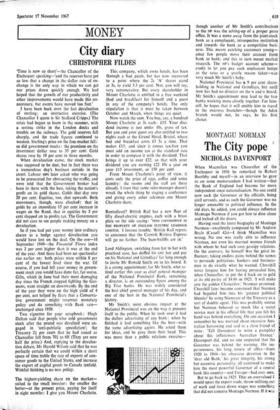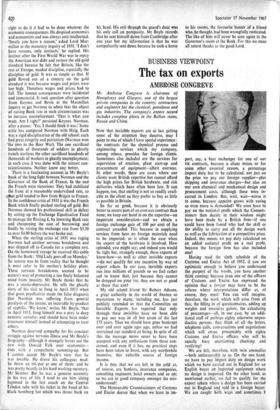The City pope
MONTAGU NORMAN NICHOLAS DAVENPORT
When Macmillan was Chancellor of the Exchequer in 1956 he remarked to Robert Bootbby and myself—in an interview he gave' us on some memorandum I had written—that the Bank of England had become far more
independent since nationalisation. No one could
now sack the Governor or his officials, Wing civil servants, and as such the Governor was no
longer amenable to political influence. In the old days, he added, you could always influence Montagu Norman if you got him to dine alone and locked all the doors.
Having read the latest biography of Montagu Norman—excellently composed by Mr Andrew Boyle (Cassell 42s)—I think Macmillan was wrong. No one was really able to influence Norman, not even his married women friends with whom he had such cosy gossipy relations. On the contrary, he himself has the great In- fluencer, taking endless pains behind the scenes to persuade politicians, bankers and business- men to do exactly what he wanted. Churchill never forgave him for having persuaded him, when Chancellor, to put the f back on to gold at its old parity of $4.86 in 1925. 'I will make you the golden Chancellor,' Norman promised. Churchill later became convinced that Norman had beguiled him into his 'greatest political blunder' by using Niemeyer of the Treasury as a sort of double agent. This was probably untrue but Norman behaved so much like a secret service man in his official life that you felt his hand was behind everything. On one occasion I remember he was worried about excessive Aus- tralian borrowing and said to a close friend of mine: 'Tell Davenport to write a pamphlet about this inflationary Australian finance.' Davenport did, and no one suspected that the Governor was behind the warning. His im- periousness, his long, tenure of office—from 1920 to 1944—his obsessive devotion to the 'dear old Bank,' his great integrity, his strong but eccentric personality, all contrived to make him the most powerful Governor of a central bank this country—and Europe—had ever seen.
But to go back to 1925. That an overvalued £ would upset the export trade, throw milliotp.out of work and force down wages was something that did not concern Montagu Norman. If it was right to do it it had to be done whatever the economic consequences. He despised economics and economists and was always anti-intellectual. 'Surely you have a reason,' asked Lord Mac- millan at the monetary inquiry of 1931. 'I don't have reasons, only instincts,' he replied. His Instinct after the First World War was to repay the American war debt and restore the old gold standard because he felt that Britain, like the rest of Europe, needed discipline, especially the discipline of gold. It was as simple as that. If gold flowed out of a country on the gold standard it was because wages and prices were too high. Therefore wages and prices had to fall. The human consequences were incidental and immaterial. It took question after question from Keynes and Bevin at the Macmillan inquiry to get Norman to admit that the object of raising Bank rate in such circumstanCes was to increase unemployment. 'That is what you Want. Am I right?' persisted Keynes. Norman, after a pause: 'Yes, I should think it was.' Some critic has compared Norman with Haig. Each was a rigid disciplinarian of the old school; each had great integrity and patriotism (Norman won 'the DSO in the Boer War). The one sacrificed hundreds of thousands of soldiers in ghastly trench warfare; the other sacrificed hundreds of thousands of workers in ghastly unemployment; in each case it was done with the utmost con- - scientiousness. Neither knew any better.
There is a fascinating account in Mr Boyle's book of the long fight between Norman and the Governor of the Bank of France. In the end the French were victorious. They had stabilised • the franc at a 'reasonable undervalued rate, so ahat gold tended to flow from Britain to France. In the confidence crisis of 1931 it was the French Bank which finally pushed sterling off gold. But Norman showed his professional skill, in defeat by setting up the Exchange Equalisation Fund to manage the floating £, by lowering Bank 'rate and cheapening the cost of borrowing and finally by raising the exchange rate from $3.20 to over $4.90 before the war broke out.
When the sterling crisis of 1931 was raging Norman had another nervous breakdown and was shipped off to Canada for a complete rest. On the homeward voyage he received this cable from the Bank: 'Old Lady goes off on Monday.' So remote was he from reality that he thought it must refer to his mother's holiday plans. these nervous breakdowns seemed to be nature's way of protecting a too finely balanced mind from insanity. Mr Boyle thinks that he was a manic-depressive. He tells the ghastly story of his visit to Jung in April 1913 when that great psychiatrist made the false diagnosis that Norman was suffering from general Paralysis of the insane, an incurable by-product of syphilis. 'We know,' writes Mr Boyle, 'that in April 1913, Jung himself was a prey to deep neurotic anxieties and should have been under treatment himself instead of attempting to treat others.
Norman deserved sympathy for his constant struggle against nervous illness and Mr Boyle's biography—although it strangely leaves out the row with Oswald Falk over economics— ends with a sympathetic summing-up. But I cannot accept Mr Boyle's view that he was lovable. He drove his colleagues mad; he threw an ink-pot at one of them; and he was pretty beastly to his hard working secretary, Mr Skinner. But he was a genuine eccentric in his way of life. I used to see him sitting bemused in the last coach on the- -Central London tube with his ticket in the band of his black homburg 'hat which wasthrust back on his head. His exit through the guard's door was his only call on poniposity. Mr Boyle records that he sent himself down from Cambridge after one year but my information is that he was compulsorily sent down because he took a horse
to his rooms, the favourite hunter of a friend who, he thought, had been wrongfully rusticated. The like of him will never be seen again in the Governor's room at the Bank. For this we must all return thanks to the good Lord.



































 Previous page
Previous page